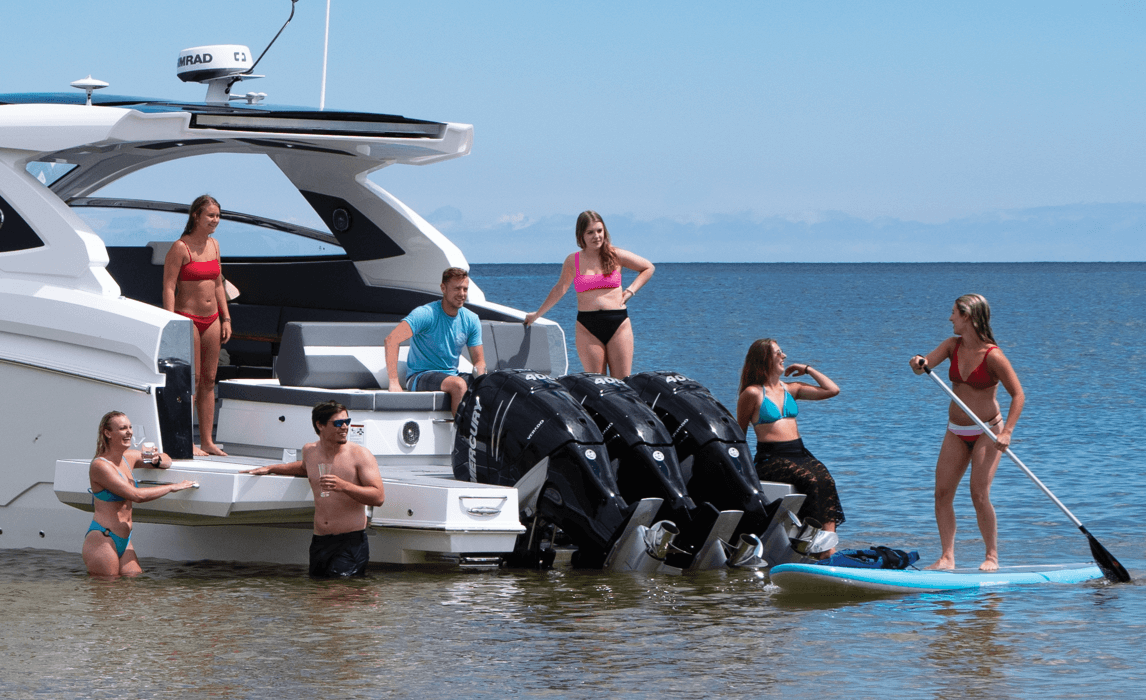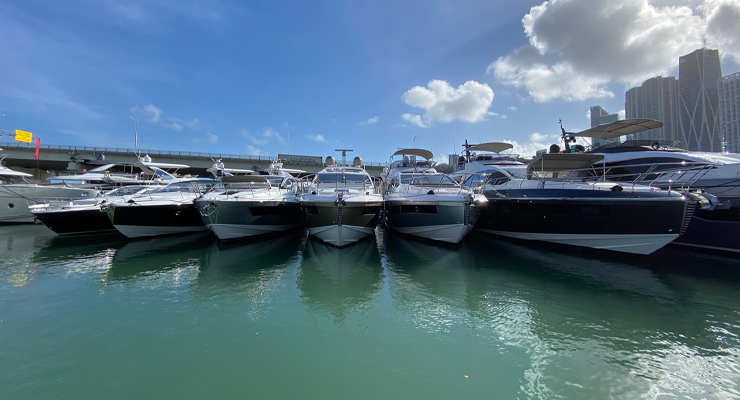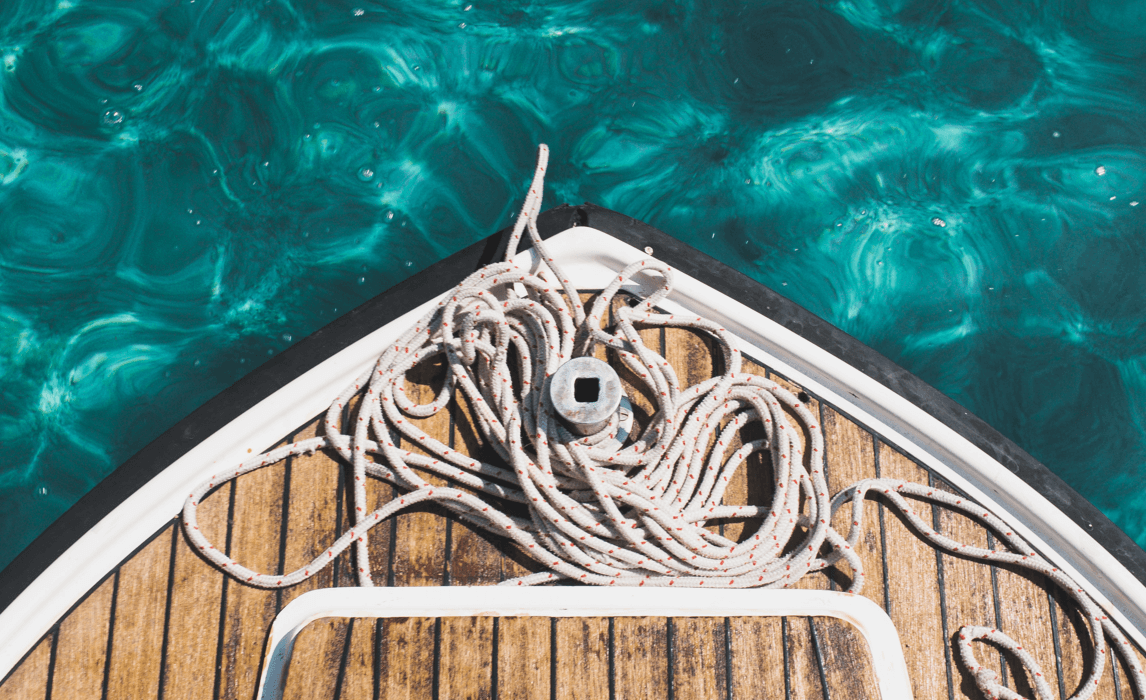NEWCOAST EXPERTISE
5 Fishing Tips for Boaters
Few activities fit better with the boating lifestyle than fishing. Catching fish from a boat gives you access to the hottest spots, the widest variety, and even deeper waters where the biggest fish wait—and having a boat designed for fishing will provide additional range, comfort, and storage space for gear. Besides having the right vessel, there are other ways and proper channels to consider for getting the most out of your adventure. Below are five tips to make fishing from a boat safer, more productive, and fun.
1. Research and Follow Local Laws and Restrictions
The U.S. Coast Guard requires that all vessels carry certain safety equipment, such as life jackets and flares. Anglers should also become familiar with local fishing regulations, restrictions, and seasons. These may include size and number limits, protected areas, and protected species.
Research local fishing forums, consult with experienced anglers, or check with local fishing authorities to gather up-to-date information on regulations and seasonal trends. Familiarize yourself with these regulations to avoid legal complications and find ways to contribute to sustainable fishing practices.
2. Research Local Aquatic Species and the Best way to Catch Them
When fishing in a new place, there is a lot to learn. All aquatic species will have their own feeding habits and an ideal location and time to pursue them. Whether you use artificial lures or live bait, selecting the right one is only half the mission—knowing how to present it is also important. Ask local anglers, check with guides and captains, and put together a mental and physical inventory of the best bait to use to increase your odds of success. .
3. Learn to Navigate Local Waters Safely
Every body of water has its unique structure and traits. Lakes near each other can even have differing ecosystems. From average wave height to water temperatures and the make-up of the bottom or ocean floor, many things change from place to place, including navigation channels, sand bars, rocks, and other dangers. Bait and tackle shops, local forums and groups, and fishing guides can all be good resources regarding topography. Ask questions about where to go safely and what places to avoid. A GPS device with chartplotter and sonar capabilities can also help with finding fish and determining depth.
4. Practice Green, or Sustainable Fishing and Boating
Fishing and boating can affect the natural environment, but boat owners and anglers can minimize their impact on the world around them. Carefully follow any posted guidelines, recognize and use resources such as spill containment tools, and avoid discharging any harmful substances. In addition, embrace practices such as catch and release or staying in channels to prevent the destruction of grass beds or coral.
5. Be Safe
During a fun day on the water, it can be easy to forget that safety should be everyone’s number one concern. Various things can lead to unsafe situations on the water, such as changes in the weather, a lack of preparedness, or alcohol. Before leaving the dock, be sure to have extra water and some snacks onboard, verify that Coast Guard safety gear is still reliable, and file a float plan so people know where you are going and what time to consider you overdue at your destination. Also, always be sure there are enough life jackets onboard and verify safety gear is in working condition. For more safety tips and guidelines, click here.
Newcoast is a leading insurance and finance provider in the marine and recreational industry. Newcoast offers competitive and customized boat loans and RV financing options, as well as tailored boat insurance plans and RV insurance programs with robust carrier options, industry-leading experience, and access to world-class partners. To obtain a loan or insurance plan that’s right for you and your boating or RV lifestyle, call (866)639-2627 or visit www.newcoast.com.
Sources:
https://www.boatus.org/study-guide/navigation/rules/https://www.discoverboating.com/resources/boating-right-of-way
https://www.boatingmag.com/how-to/right-of-way-rules-for-boaters/
https://www.boatus.com/expert-advice/expert-advice-archive/2015/december/marine-navigation-rules
https://www.araglegal.com/individuals/learning-center/topics/home-and-property/summer-boating-safety-tips
https://www.nsc.org/community-safety/safety-topics/seasonal-safety/summer-safety/boating
https://www.discoverboating.com/ownership/safety/tips
https://www.oceanbluefishing.com/magazine/fishing-safety-tips/
https://www.chubb.com/us-en/individuals-families/resources/12-safety-tips-for-recreational-boaters.html
https://www.boatline.com/blog/2021/11/17/11-key-safety-tips-for-boaters/?cmp=google_paidsearch_Boatline-BoatGeneralKW_DSAGeneral&gclid=Cj0KCQjw7uSkBhDGARIsAMCZNJuKwCbfNlHL04K8XBIEV_OCXl-iN-GFslpkHRo1-rb0-4DKnJQ7MSsaAge6EALw_wcB
https://www.nps.gov/articles/fishing-safety.htm
https://www.nasbla.org/nasblamain/nasbla-resources/statelawdashboards
https://www.nasbla.org/about-nasbla/boating-contacts
https://www.boatsetter.com/boating-resources/green-boating-and-sustainability
https://education.nationalgeographic.org/resource/sustainable-fishing/
https://www.seagoinggreen.org/blog/5-practices-for-sustainable-boating
https://www.sailorsforthesea.org/programs/green-boating-guide
https://www.discoverboating.com/resources/clean-boating-best-practices-for-boaters
https://www.nps.gov/subjects/fishing/how-to-safely-catch-and-release.htm
https://www.takemefishing.org/how-to-fish/how-to-catch-fish/
https://www.fisheries.noaa.gov/rules-and-regulations
https://www.findlaw.com/state/state-fish-and-game-laws/fishing-laws-by-state-findlaw.html

insights
Finding the Right Boat or YachtNEWCOAST EXPERTISE Finding the Right Boat or Yacht for You? With Newcoast by your side, findi...
Learn More
expertise
How to get the best interest rateNEWCOAST ADVANTAGE How to Get the Best Interest Rate If you're looking for the best rates an...
Learn More
insights
Boat Show TipsNEWCOAST DIFFERENCE Headed to a Boat Show? So many boats and yachts all in one place! Shoppi...
Learn More
expertise
Understanding Your Credit ScoreNEWCOAST EXPERTISE Understanding Your Credit Score Have you been considering a loan to purchas...
Learn More